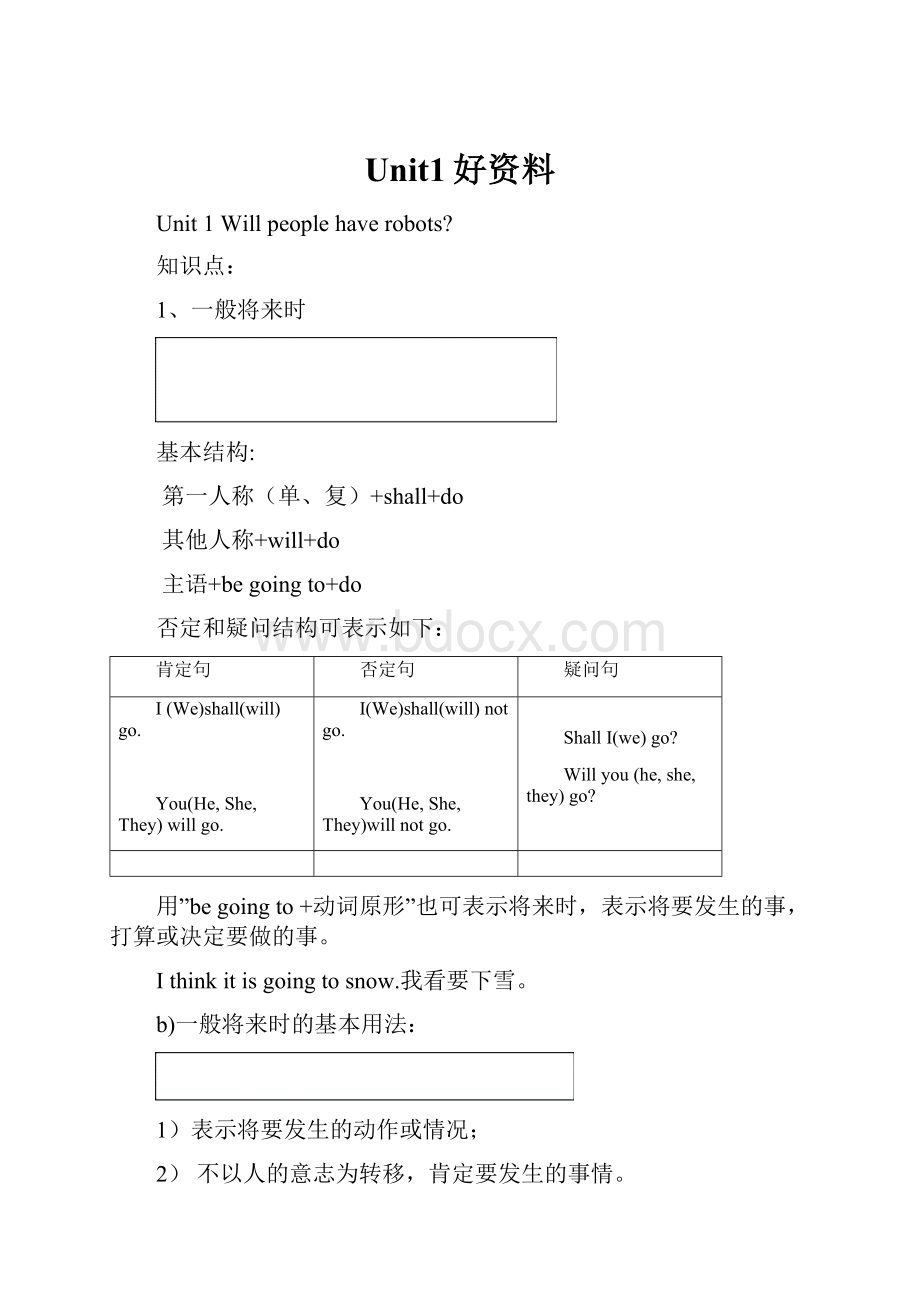Unit1好资料.docx
《Unit1好资料.docx》由会员分享,可在线阅读,更多相关《Unit1好资料.docx(28页珍藏版)》请在冰豆网上搜索。

Unit1好资料
Unit1Willpeoplehaverobots?
知识点:
1、一般将来时
基本结构:
第一人称(单、复)+shall+do
其他人称+will+do
主语+begoingto+do
否定和疑问结构可表示如下:
肯定句
否定句
疑问句
I(We)shall(will)go.
You(He,She,They)willgo.
I(We)shall(will)notgo.
You(He,She,They)willnotgo.
ShallI(we)go?
Willyou(he,she,they)go?
用”begoingto+动词原形”也可表示将来时,表示将要发生的事,打算或决定要做的事。
Ithinkitisgoingtosnow.我看要下雪。
b)一般将来时的基本用法:
1)表示将要发生的动作或情况;
2)不以人的意志为转移,肯定要发生的事情。
ThedayaftertomorrowwillbeNationalDay.
c)一般将来时的时间状语标志词:
1.含tomorrow;next短语;
2.in+段时间;
3.howsoon;
4.by+将来时间;
5.bythetimesb.do…
6.祈使句句型中:
or/andsb.willdo
7.在时间/条件状语从句中,如果从句用一般现在时,主句用将来时
8.anotherday
2、in 与after的区别
句子(一般将来时)+in+时间
句子(一般过去时/一般将来时)+after+时间
例句:
I'llbebackinhalfanhour.我半小时后就回来.
after和in都可以表示"以后"的意思,其区别是:
1)after以过去为起点,表示过去一段时间以后,常用于过去时态的句子。
例如:
Theystartedworkingafterlunch.他们是午餐后开始工作的。
Thefilmwasshownafterthemeeting.电影是会议结束以后放的。
2)in以现在为起点,表示将来一段时间以后,常用于将来时态的句子。
如:
Theywillstartworkinginhalfanhour.他们将在半小时后开始工作。
Thefilmwillbeshownin2or3days.这部电影将在两三天后上映。
3)在某个特定的时间以后,after也可用于将来时态的句子。
例如:
Theywillstartworkingafter10am.他们将在上午10点以后开始工作。
Thefilmwillbeshownafter5o'clock.这部电影将于4点以后上映。
4)“after+一段时间”或“一段时间+later”表示“(在过去某个时间看来)一段时间之后”。
Hewenthomeaftertwodays.
他两天后回家了。
Threeyearslater,shehadababy.
三年后,她生了一个婴儿。
针对性练习
一.根据句意,用括号中动词的适当形式填空。
1.We________(go)fishingtomorrow.
2.Whatareyougoing________(do)thisevening?
3.—Wouldyouliketoplayfootballwithus?
—I'dloveto.ButI________(help)mymotherafterlunch.
4.—Isyourbrotherin?
—Yes.Buthe____(leave)forEgyptsoon.
5.—Whattime________we________(start)?
—Ateighttomorrowmorning.
二.请在下列各题空格处填入shall或will。
1.You______notdrivethrougharedlight.
2.I______doeverythingforher.
3.______youhelpmewiththisheavybag,John?
4.______Ihelpyouwiththatheavybag,Madam?
5.Let'sgoandtakeawalkafterdinner,____we?
6."Noone______leavetheclassroomifIhaven'tsaidOkay,"saidtheteacher.
7.It______soonbeover,Iamsure.
8.Dowhatyou______,butdon'tgoout.
9.I______takeyoutherewithme,ifit'sOKwithyourmother.
10.Rainorshine,I______come.
3.fall的短语:
n.秋天,秋季
v.掉落,掉下
(1)fallbehind:
落在······的后面
e.g.Workharder,oryouwillfallbehindothers.
(2)falloff:
从······上掉下来
e.g.Maryfellofftheladderlastnight.
(3)fallinlovewith
(4)falldown跌倒
(5)fallasleep入睡
4、Therebe结构
英语中,Therebe句型常表示某处有某人或某物。
例如:
Therearealwaysmorethanonehundredbirdsinthebigtreeeveryevening.每天傍晚那棵大树上总会有100多只小鸟。
一、Therebe句型的用法:
1)There与be中间可插入一些表示推测的情态动词、表示时态的短语和一些动词短语,以强调某种语气。
例如:
Theremustbesomeflowersinthebox.盒子里肯定有些鲜花。
Therehappenedtobesomemoneyinmypocket.我的口袋里碰巧有一些钱。
Therewillbeameetingthisafternoon.注意:
be不能换成have及have的变化形式。
2)Therebe句型常与过去时间状语连用,构成一些固定句型,用于故事发生的开头,交代故事发生的时间。
例如:
Manyyearsago,therewassuchabeautifulgirlcalledCindy.很久以前有一个叫Cindy的美丽女孩。
3)Therebe句型可换成Therecome/go,以引起注意,加强语气。
例如:
Therecomesthebus.公共汽车来了。
4)Therebe句型或There加其他动词的句型,其动词的单复数,常采用就近一致的原则。
例如:
Thereisadesk,twochairsandthreebenchesintheroom.Therearetwochairs,adeskandthreebenchesintheroom.
5)Therebe或There加其他动词的句型,其反意疑问句一律用…there?
例如:
Thereisacatinthegarden,isn'tthere?
Thereusedtobenohousehere,usedthere/didthere?
(过去这儿没有房子,是吗?
)
二、使用Therebe句型时应注意:
1、therebe结构中的be是可以运用各种时的。
Thereisgoingtobeameetingtonight. 今晚有个会议。
Therewasaknockatthedoor. 有人敲门。
Therehasbeenagirlwaitingforyou. 有个女孩一直在等你。
Therewillberainsoon.不久天就要下雨了。
2. 动词be单复数形式要跟therebe之后的真正的主语一致。
并且要根据就近一致原则来变换be的单复数形式。
如:
Thereisabookonthedesk.课桌上有一本书。
Howmanypeoplearethereinthecity?
这个城市里有多少人口。
Thereisapenandtwobooksonthedesk. 课桌上有一个钢笔和两本书。
3.在there be引起的句子结构中,用来修饰主语的不定式主动形式和被动 形式均可。
Thereisnotimetolose (=tobelost).时间紧迫。
Thereisnothingtosee (=tobeseen).看不见有什么。
Thereisnothingtodo.(=tobedone) 无事可做。
4、Thereisnodoing.(口语)不可能…….
Thereisnotellingwhenhewillbeback.
无法知道他什么时候回来。
Thereisnoknowingwhatheisdoing.
无法知道他在做什么。
4、.therebe与have的区别:
1)含义不同。
therebe表示的是“某地(时)有某人(物)”,强调“存在关系”。
Have则表示“某人(物)所有”,强调“所属关系”。
如,
Thereisabusinyourfactory.(公共汽车不一定属于我们厂所有)
Ourfactoryhasabus.(公共汽车属于我们厂所有)
2)句型不同。
therebe句型为“Therebe+某人(物)+某时(地)”;have句型为“某人(物)+have(has)+某物(人)。
如Thereisn’tacatunderthechair.Shedoesn’thavetwobrothers.
3)当表示某物的构成和组成部分时,用therebe和have均可。
如,Ourschoolhassixtyclasses.=Therearesixtyclassesinourschool.我们学校有60个班。
【注意】therebe句型中有两个或多个并列主语时,须根据就近原则,be与最靠近的主语在数上保持一致。
如,Therearetwoeggsandacupofmilkonthetable.
Therebe句型的将来时表达方式:
肯定:
Therewillbe…否定:
Therewon’tbe…一般疑问句:
Willtherebe….?
Yes,therewill.No,therewon’t.
相关练习:
1.There___anyriceinthebowl.
A.are B.is C.isn’t D.aren’t
2.There___not___milkinthecup.
A.are,many B.are,much C.is,many D.is,much
3.There___manyapplesonthetreelastyear.
A.havebeen B.were C.are D.is
4.Doyouknowif___ameetingnextSunday?
A.therewasgoingtohave B.therewasgoingtobe
C.istheregoingtobe D.therewillbe
5.-Isthisthelastexamwehavetotake?
-No,butthere____anothertestthreemonthslater.
A.willbegoingto B.is C.willbe D.hasbeen
6.There______greatchangesinsuchkindofcomputersinthelastfewyears.
A.is B.are C.willbe D.havebeen
7.There _____ afilmtomorrowevening.
A.willhave B.have C.isgoingtobe D.has
8.There____aschoolatthefootofthehill.
A.have B.stand C.are D.stands
9.There'sgoingto____intomorrow'snewspapers.
A.havesomethingnew B.havenewsomething
C.besomethingnew D.benewsomething
10.Thereissomemilkinthebottle,____?
A.isn'tthere B.aren'tthere C.isn'tit D.arethere
11.Howmanyboys____thereinClassone?
A.be B.is C.are D.am
12.There____alotofgoodnewsintoday'snewspaper.
A.is B.are C.was D.were
13_anyflowersonbothsidesofthestreet?
A.Isthere B.Arethere C.Has D.Have
14.There____greatchangesinourcountrysince1982.
A.havebeen B.were C.hasbeen D.are
15.Thereislittlewaterintheglass,____?
A.isn'tthere B.isn'tit C.isit D.isthere
16.----Thereisnoairorwateronthemoon.Isthere?
---____.
A.Yes,thereare B.No,thereisn'tC.Yes,thereisn't D.No,thereis
17.----Whatdidyouseeinthebasketthen?
----There____abottleoforangeandsomeoranges.
A.is B.are C.was D.were
18.____anyflowersonbothsidesofthestreet?
A.Isthere B.Arethere C.Has D.Have
19.____isthereonthetable?
A.Howmanyapples B.Howmuchbread
C.Howmuchbreads D.Howmanyfood
20.Thereisn't____paperinthebox.Willyougoandgetsomeforme?
A.any B.some C.a D.an
4、everyday与everyday区别:
everyday名词短语,表示“每天”,通常与一般现在时连用;而everyday形容词,表示“日常的,每天发生的,每日所用的”。
例如:
Igetupatsixeveryday.我每天6点起床。
Hewearseverydayclothestoday.今天他穿一身便服。
Wear、puton、have..in的区别
wear表示“穿”,表示状态,用一般现在时表示经常状态,用现在进行时表示暂时状态。
eg.Wewearourrainbootsonarainyday.
我们在下雨天穿雨鞋。
Sheiswearinganewcoat.
她穿着一件新衣服。
Doeshewearglasses?
她戴眼镜吗?
puton是“穿上”,“戴上”的意思,强调动作。
eg.Sheputonaredcoatandwentout.
她穿上红色大衣出去了。
注意:
puton是一时的动作,不能跟表示一段时间的状语连用。
他整天戴着草帽。
误:
Heputsonahatallday.
正:
Hewearsahatallday
5、.beworthdoing值得;
beworthyofdoing,
beworthytodo值得
6、Seem的用法:
1)seemtodo似乎…Heseemstothinkso.
2)Itseemsthat看来…Itseemsthatheislying.
3)seem+adj./n.好象是…Heseemsill.
7、wouldlikesth意思为“想要某物“;
wouldliketodo意思为“想要做某事”。
回答wouldlike句型的一般疑问句时,其肯定回答为“Yes,please.”;否定回答“No,thanks”或“I’dlike/loveto,but….”
8、.makesb.do;make+n+adj.;makefriendswithsb.;make+n./pron.+n.
9、.Such作形容词,意思是“如此的”“这样的”,修饰各种名词。
ØSuch这样的。
如Itissuchbadweather.天气如此恶劣。
ØSuch常和as搭配,表示一种类别。
如Weenjoysuchavoiceashers.我们喜欢象她那样的嗓子。
ØSuch常和表示结果的that从句搭配,表示“如此….以至于…”如
Itwassuchahotdaythatweallhadtostayathome.
ØSuch…that…和so…that…都可用来引出一个结果状语从句。
由于such是形容词,所以that从句前有一个受such修饰的名词;而so是副词,用以修饰形容词或副词,因此that从句前一般不出现名词。
如
Theyaresuchkind-heartedteachersthatpeopleinthevillageallrespectthem.
Theexamwassodifficultthatmanystudentsfailedtopassit.
a)如果名词是可数名词的单数形式,such和so的位置不同:
such+a/an+形容词+单数名词
so+形容词+a/an+单数名词
b)如果名词是不可数名词或名词复数,只可用such,不能用so.:
such+形容词+不可数名词或复数名词
c)如果被修饰的不可数名词被much,little,或复数名词被many,few等表示量的形容词修饰时,用so,不用such.
d)当little表示“年纪小的”时,可用such+little+名词
Thereweresuchlittlechildrenthattheycouldn’tcleantheroom.
11、beableto为“能,会”,表示能力,在这个意义上与can的意思相同,一般情况下两者可以互换,但can只有现在式和过去式(could)而beableto则用于更多的时态,主要体现在be的变化。
两者在用法上有一些差异:
can(could)表示主观能力不表示意愿,它的将来时用willbeableto而beableto表示主观意愿强调克服困难做某事。
12.Feed-fed-fed.
Feedsthtosb把…食物给…;
feedsbonsth
13.use的短语:
(1)beusedby:
被······使用
e.g.Rocketsareusedbyastronauts.
(2)usesth.todosth.:
使用某物做某事
e.g.Heoftenusesthecomputertostudy.
14、will与would的区别
一、will
1.表示意志、意愿,有“愿、要”之意。
例如:
1)Wewillfightonuntilfinalvictoryiswon.
2)Iwilldomybesttohelpyou.
3)Shewillnotshovetheheavyloadontoothers.
2.在疑问句中用于第二人称,表示说话人向对方提出请求或询问对方的意思,有“你………好吗、你愿………”。
例如:
1)Willyouhelpmewithmywork?
2)Willyoujoinourdiscussion?
3.表示习惯、经常性、倾向性,有“惯于、总是”等意义。
例如:
Everymorninghewillhaveawalkalongthisriver.
4.在if,when,until等连词引导的表示时间或条件的从句中要用一般时表将来,但在if从句中有时为了表示意愿也可用will,有“愿意”的意思。
例如:
1)Ifyouwillreadthisarticle,youwil